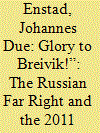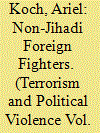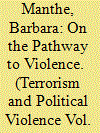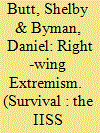|
|
|
Sort Order |
|
|
|
Items / Page
|
|
|
|
|
|
|
| Srl | Item |
| 1 |
ID:
190910


|
|
|
|
|
| Summary/Abstract |
Despite the ongoing need for researchers, practitioners, and policymakers to identify and assess the online activities of violent extremists prior to their engagement in violence offline, little is empirically known about their online behaviors generally or differences in their posting behaviors compared to non-violent extremists who share similar ideological beliefs particularly. In this study, we drew from a unique sample of violent and non-violent right-wing extremists to compare their posting behaviors within a sub-forum of the largest white supremacy web-forum. Analyses for the current study proceeded in three phases. First, we plotted the average posting trajectory for users in the sample, followed by an assessment of the rates at which they stayed active or went dormant in the sub-forum. We then used logistic regression to examine whether specific posting behaviors were characteristic of users’ violence status. The results highlight a number of noteworthy differences in the posting behaviors of violent and non-violent right-wing extremists, many of which may inform future risk factor frameworks used by law enforcement and intelligence agencies to identify credible threats online. We conclude with a discussion of the implications of this analysis, its limitations and avenues for future research.
|
|
|
|
|
|
|
|
|
|
|
|
|
|
|
|
| 2 |
ID:
188102


|
|
|
|
|
| Summary/Abstract |
Many researchers, practitioners, and policymakers are concerned about online communities that are known to facilitate violent right-wing extremism, but little is empirically known about these digital spaces in general and the developmental posting behaviors that make up these spaces in particular. In this study, group-based trajectory modeling—derived from a criminal career paradigm—was used to identify posting trajectories found in the open-access sections of the Iron March and Fascist Forge forums, both of which have gained notoriety for their members’ online advocacy of violence and acts of violence carried out by them. Multinomial logistic regression and analysis of variance were then used to assess whether posters’ time of entry into the violent forums predicted trajectory group assignment. Overall, the results highlight a number of similarities and differences in posting behaviors within and across platforms, many of which may inform future risk factor frameworks used by law enforcement and intelligence agencies to identify credible threats online. We conclude with a discussion of the implications of this analysis, followed by a discussion of study limitations and avenues for future research.
|
|
|
|
|
|
|
|
|
|
|
|
|
|
|
|
| 3 |
ID:
156903


|
|
|
|
|
| Summary/Abstract |
This article documents Anders Behring Breivik's reception on the Russian far Right, with a comparative view to Western Europe. On July 22, 2011, Breivik carried out two terrorist attacks in Norway, killing 77 people. Based on a variety of open sources, the article finds that Breivik has received much more open support in Russia than in Western Europe. I suggest there are three main reasons why Russia stands out. First, a weaker social stigma attached to Right-Wing extremism reduces the cost of publicly embracing Right-Wing terrorists. Second, higher levels of violence in Russian society increase desensitization and violence acceptance. Third, the embrace of Breivik fits into a vibrant tradition of iconizing Right-Wing militants on the Russian far Right. The article highlights Russia as a hotspot of Right-Wing extremist activism in Europe. It also provides insights that may prove useful in future comparative research on cross-national variation in Right-Wing violence and terrorism.
|
|
|
|
|
|
|
|
|
|
|
|
|
|
|
|
| 4 |
ID:
160302


|
|
|
|
|
| Summary/Abstract |
This essay systematically explores the role the immigration issue played in the electoral and overall political power structure of right-wing extremism in Greece as expressed by Golden Dawn. It employs a political-opportunity structure along with a discursive-opportunity structure approach in several instances, with special reference to the so-called refugee crisis during 2015–16. It argues that there is no simple and straightforward connection between immigration and an increase of extremism, and that even sudden and massive immigration flows is not a sufficient condition. Instead, to understand the rise in extremism, long-term, medium-term, and short-term variables must all be considered.
|
|
|
|
|
|
|
|
|
|
|
|
|
|
|
|
| 5 |
ID:
178937


|
|
|
|
|
| Summary/Abstract |
The ongoing war in Syria reflects the interesting phenomenon of foreigners flocking to the troubled region to join the combat. While foreign Jihadists joining the fighting ranks of terror organizations such as the Islamic State or Al Qaeda have attracted considerable reporting and research, the flip side of this phenomenon has gone largely unnoticed—that of the foreign anti-ISIS fighters. Although these fighters share a common enemy, adversary on the battlefield, they hold disparate personal ideologies and motives. This article will examine manifestations of foreign anti-ISIS fighters affiliated with both the far right and far left ideologies, in order to contribute to the understanding of this unfamiliar aspect of the war in Syria and its scope, as well as the potential consequences and potential threats it embodies.
|
|
|
|
|
|
|
|
|
|
|
|
|
|
|
|
| 6 |
ID:
178903


|
|
|
|
|
| Summary/Abstract |
West German society faced the emergence of a new calibre of right-wing terrorism in the 1970s. Right-wing terrorist groups evolved that showed themselves willing and able to commit violent attacks such as bombings and murder. This article explores the genesis and development of right-wing terrorism in West Germany between 1970 and 1980 while examining 22 identifiable groups and lone actors and taking into consideration the radicalization within the far right as well as the prevailing social conditions. West German right-wing terrorism until 1990 has remained a blind spot in historiography to this day. This article contributes to historical terrorism studies as well as to studies into the far right while applying historical-qualitative methods and interpreting primary sources. Using an approach informed by social history, this paper sheds new light on the individual participants, groups, and networks of right-wing terrorism as well as on its topics and targets. While taking into account a more dynamic definition of right-wing terrorism, this paper disengages from definitions that identify terrorism solely as a threat to the state itself. This makes possible a multidimensional approach employing contemporary history and studies in both terrorism and right-wing extremism.
|
|
|
|
|
|
|
|
|
|
|
|
|
|
|
|
| 7 |
ID:
172489


|
|
|
|
|
| Summary/Abstract |
Russia is cultivating extreme right-wing support to undermine the West, using a variety of actors to woo different partners.
|
|
|
|
|
|
|
|
|
|
|
|
|
|
|
|
| 8 |
ID:
049455


|
|
|
|
|
| Publication |
London, Frank Cass, 2003.
|
| Description |
xv, 311p.
|
| Series |
Cass series on political violence
|
| Standard Number |
0714681881
|
|
|
|
|
|
|
|
|
|
|
|
Copies: C:1/I:0,R:0,Q:0
Circulation
| Accession# | Call# | Current Location | Status | Policy | Location |
| 047285 | 320.50905/MER 047285 | Main | On Shelf | General | |
|
|
|
|
| 9 |
ID:
175369


|
|
|
|
|
| Summary/Abstract |
This article provides a re-theorization of the Prevent strategy as racialized bordering. It explores how knowledge regarding the racist logics of British counter-terrorism are supressed through structures of white ignorance and how International Relations scholarship is implicated in this tendency to ‘whitewash’ Prevent’s racism. Building on the use of science fiction in International Relations, the article uses China Miéville’s novel The City and the City to undertake the analysis. Miéville evokes a world where the cities of Ul Qoma and Besźel occupy the same physical space but are distinct sovereign jurisdictions. Citizens are disciplined to ‘see’ their city and ‘unsee’ the other city to produce borders between the two. The themes of coding signifiers of difference and seeing/unseeing as bordering practices are used to explore how Prevent racializes Muslims as outsiders to a white Britain in need of defending. Muslim difference is hypervisibilized or seen as potentially threatening and coded as part of racialized symptoms which constitute radicalization and extremism. This article shows how the racial bordering of Prevent sustains violence perpetrated by white supremacists, which is subsequently ‘unseen’ through the case of Thomas Mair.
|
|
|
|
|
|
|
|
|
|
|
|
|
|
|
|
|
|
|
|
|